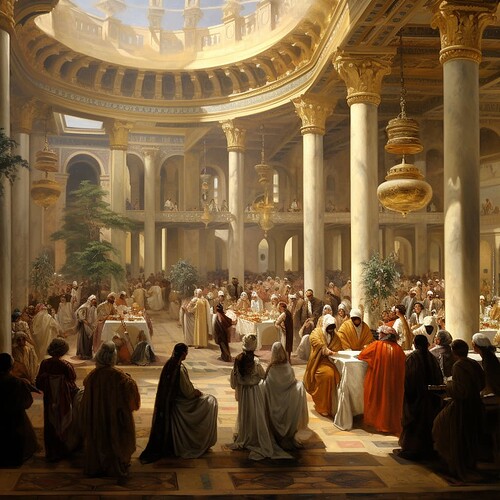Exploring Profound Truths Through Jesus’ Words
 Introduction
Introduction
On January 20th, our reading takes us to Matthew 22, where Jesus presents some of his most profound parables and teachings. These narratives offer deep insights into the kingdom of heaven, the nature of God’s commandments, and the discernment of spiritual truths.
 Matthew 22: Parables and Teachings
Matthew 22: Parables and Teachings
In Matthew 22, Jesus addresses both the crowds and the religious leaders with parables like the Wedding Banquet, and responds to their challenging questions with wisdom that reveals deeper spiritual principles.
Key Verse: “Jesus replied: ‘Love the Lord your God with all your heart and with all your soul and with all your mind.’ This is the first and greatest commandment.” — Matthew 22:37-38
 Key Themes and Reflections:
Key Themes and Reflections:
The Kingdom of Heaven: The parable of the Wedding Banquet illustrates the openness of God’s kingdom to all who are willing to accept the invitation.
The Greatest Commandment: Jesus’ teaching on the greatest commandment underscores the foundational importance of love in our relationship with God and others.
Wisdom in Controversy: Jesus demonstrates remarkable wisdom in responding to tricky questions, revealing truths that transcend the superficial understanding of his challengers.
 Today’s Application:
Today’s Application:
Reflect on how you can incorporate the principle of loving God and your neighbor into your daily life. Consider the ways in which Jesus’ teachings challenge conventional thinking and invite deeper spiritual understanding.
 Hidden Gem:
Hidden Gem:
Did you know? The question about paying taxes to Caesar not only addresses the issue of civic duty but also highlights the priority of spiritual allegiance to God.
 Reflective Q&A:
Reflective Q&A:
![]() Matthew 22: Understanding Jesus’ Teachings
Matthew 22: Understanding Jesus’ Teachings
![]() Responding to Divine Invitation: How does the parable of the Wedding Banquet challenge us to respond to God’s invitation?
Responding to Divine Invitation: How does the parable of the Wedding Banquet challenge us to respond to God’s invitation?
A: This parable encourages us to not only accept God’s invitation with gratitude but also to prepare ourselves appropriately for participation in His kingdom.
![]() The Essence of the Law: What does Jesus’ identification of the greatest commandment teach us about the essence of God’s law?
The Essence of the Law: What does Jesus’ identification of the greatest commandment teach us about the essence of God’s law?
A: Jesus’ emphasis on love as the greatest commandment highlights that the core of God’s law is relational, focusing on our love for God and for our fellow human beings.
 Join the Discussion:
Join the Discussion:
How do these teachings from Matthew 22 impact your understanding of God’s kingdom and His expectations for us? Share your insights and experiences in the comments below!
#Matthew22 #JesusTeachings #LoveGod #LoveNeighbor #BibleStudy #SpiritualGrowth
![]() See You Tomorrow in Matthew: Continue exploring the profound teachings of Jesus in the gospel of Matthew.
See You Tomorrow in Matthew: Continue exploring the profound teachings of Jesus in the gospel of Matthew.
 Join the forum!
Join the forum!
Deepen your spiritual journey in our AIgniteScripture Community:
Free Members: Join vibrant discussions and access extensive biblical resources. Sign up here: 🌟 How to Join Page - Membership Options
Supporters Membership ($20/month or $200/year): Access in-depth newsletters, exclusive forum privileges, and contribute to our community’s growth. Become a Supporter: 🌟 How to Join Page - Membership Options
![]() Stay Updated with our AIgniteScripture Newsletter: Follow daily readings and delve deeper into biblical insights with AI-enhanced study. Subscribe here: https://newsletter.aignitescripture.com/
Stay Updated with our AIgniteScripture Newsletter: Follow daily readings and delve deeper into biblical insights with AI-enhanced study. Subscribe here: https://newsletter.aignitescripture.com/
